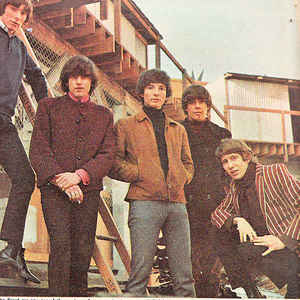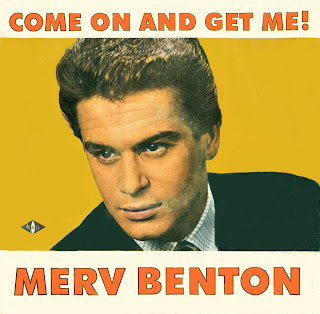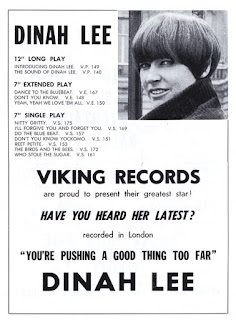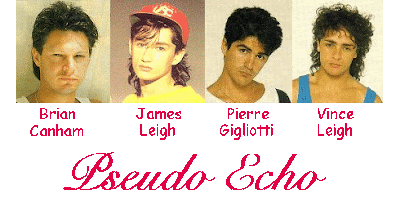A1 (I Do The) Shimmy Shimmy
A2 Mess Of Blues
A3 Lotta Lovin'
A4 Cincinatti Fireball
A5 Twenty Flight Rock
A6 Come On And Get Me
B1 Baby, Let's Play House
B2 Nervous Breakdown
B3 Love Me Tender
B4 Pretty Girls Everywhere
B5 Don't Leave Me Now
B6 Honey Don't
The Merv Benton story is a fascinating chapter of the Beat Boom in Australia. From his base on the Melbourne dance circuit, Merv gained national attention and quickly became one of the most popular male singers in the country. In early 1964 he signed with Melbourne's W&G Records and became one of their most prolific artists, releasing seventeen singles, six EPs, and three LPs between 1964 and 1967, and scoring an impressive run of fifteen Top 40 singles in his hometown (several of which also charted in other cities). But in 1967, at the height of his popularity, Merv was struck down by throat problems that ended his singing career.

Merv (real name Mervyn Bonson. b. 12 August 1942) grew up in the Melbourne suburb of Reservoir and went to school at Preston High, where he was an enthusiastic tennis player. After he left shool he joined a major Victorian bank as a trainee but as a teenager he listened avidly to rock'n'roll on Melbourne radio and was captivated by the music of Elvis Presley, Sam Cooke, Gene Vincent, Chuck Berry, Little Richard and Jerry Lee Lewis. Merv saw his first Lee Gordon 'Big Show' in 1957, which featured Bill Haley & The Comets, The Platters and Freddie Bell and it was Bell especially who fired Merv's desire to become a singer.
His entry into showbiz was a classic tale, not dissimilar to that of American comedy star Adam Sandler. He started to attend dances at which pioneering Melbourne rock'n'roll band The Planets were the headliners, and he became friends with several of the group, especially the pianist Graeme Howie. Unbeknownst to Merv, Graeme entered him in a talent contest at the local Canterbury Ballroom in October 1960. By the time his name was called it was too late to back out, but as it turned out his very first public performance -- singing "Don't Leave Me This Way" -- won him first place. The same night he met young promoter Brian de Courcy.
A week later Merv met with De Courcy and decided to tfollow his dream of becoming a singer. Brian installed Merv as the vocalist with The Ramrods, a group led by Ian B. Allen and he was soon performing with them at venues like Whittlesea Hall and the Preston Migrant Centre. He quickly built up a strong local following -- creating what historian Noel McGrath charmingly describes as "mild hysteria" -- and even before his first record release he had his own fan club, with over 250 members -- a remarkable feat considering his only exposure at this stage was at local dances in Melbourne.
Early in 1964 Merv was invited to make some demo recordings for the W&G label. The session was produced by Johnny Chester and the backing was provided by Les Stacpool (guitar), Albert Stacpool (keyboards), Frank McMahhon (bass) and Mick Lynch (drums); also in the studio was the renowned Stan Rofe, who helped advised and encouraged many Australian acts including Merv.
W&G were happy enough with the demo to select two tracks from it for Merv's debut single -- a version of Elvis Presley's "Baby, Let's Play House", backed by "Endless Sleep", which was the first in a string of Top 40 singles, reaching # 17 on the Melbourne charts, which in turn led to TV appearances on Graham Kennedy's In Melbourne Tonight.
He was soon back in the studio to cut his next single; the original choice was Carl Perkins' "Honey Don't" but this was abandoned after The Beatles' version was released. a version of the Eddie Cochran classic "Nervous Breakdown" (b/w "Don' Cha Think It's Time") -- this time backed up by W&G's brilliant 'house' band, The Strangers -- but amid the hullaballoo of The Beatles tour was largely ignored and only reached #40 on the Melbourne charts, although Merv says that it was one of his most requested numbers.
Merv's look has been described as being in contrast to the new wave of long-haired, Liverpool-sound groups of the era but this is something of a misnomer. Films and photos of the period wll reveal that Merv's style was actually fairly typical of the time -- take a look at an old Aztecs clip, for example -- and with his clean-cut image and matinee-idol good looks, immaculately coiffed hair and sharply tailored clothes he undoubtedly won the hearts of young fans all over Australia.
Merv's next single, "Be Sweet" b/w "You're The Dog" (Aug. 1964) was issued as a reaction to criticism the W&G label was getting from radio. W&G's two-trackstudio was fairly primitive, even by the standards of the day, and some Melbourne DJs were critical of the poor sound on W&G recordings. This became a perennial problem for Australian artists and led to the long-standing practice of taking major releases to the USA to be mastered, due to Australia's relative lack of expertise in that area. Both songs on this sngle were covers of German pop songs which W&G had sourced through its publishing connections. The instrumental tracks were completely recorded in Germany, with Merv's vocals overdubbed vocals over the top. It helped to restore Merv's chart fortunes, reaching # 22 in Mebourne.

Merv's first year as a pop star was frantic -- in just nine months he had released four singles, one EP and one LP By the end of '64, the 19-year-old singer had appeared on appeared on national television shows such as Brian Henderson's Bandstand and Johnny O'Keefe's Sing Sing Sing, and W&G released his debut album, Come On And Get Me, by which time he had become a regular on national and local TV pop shows; and had toured the country supporting Merseybeat star Billy J. Kramer.
Merv's career peaked during 1965, thanks to a continued run of successful singles. "I Got Burned" / "Cincinatti Fireball" (May) became a double-sided hit and proved to be his most successful 45 -- the A-side reached #3 in Melbourne, and the B-side was Top 5 in both Brisbane and Adelaide. His cover of Bobby "Blue" Bland's "Yield Not To Temptation" (August) reached #6 in Melbourne and also made the Adelaide Top 40. Merv's version of Crahs Craddock's "Don't Destroy Me" (October) was a Top 20 hit in Melbourne, and is also notable as one of the very first Australian pop singles to be released in a picture sleeve. Merv recalls that Noel Watson's "Can I Believe It's True" was always intended as the A-side and that he was disappointed when radio picked up "Don't Destroy Me" instead.

His next single "(I Do) The Shimmy Shimmy '65" (Dec. 1965) was evidently a filler track, issued by W&G to maintain Merv's release schedule. It was in fact a 'very simple remix' of the B-side of "Come On And Get Me"; the only difference was an additional backing vocal by Noel Watson, and Merv recalled: "No-one was more surprised than I when I heard it on the radio."
Throughout the year he toured around Australia with his new backing group, The Tamlas. The original lineup was Charlie Gauld (guitar, ex-Thunderbirds), Ian B. Allen (bass, ex-Planets), and Eddie Chappell (drums, ex-Checkmates), but for most of their career The Tamlas comprised Chappell, the legendary Les Stacpool (guitar, ex-Chessmen), Noel Watson (guitar) and Dennis Tucker (bass, ex-Rondells). The lineup that backed Merv on most of his recordings was Les Stacpool and Noel Watson (guitars), Murray Robertson (keyboards), Dennis Tucker (bass) and Eddie Chappell (drums), with backing vocals on most of the singles by the trio of Pat Carroll, Anne Hawker and Julie McKenna.
Merv was evidently widely popular -- on her Brisbane In The Sixties site, Queensland rock fan Di Bingham cites Merv as one of her favourite Aussie performers of the period. He released four more singles in 1966 and, says McGrath, "created great excitement amongst female fans wherever he sang". He continued into 1966 "on the crest of a wave" with his winning formula of re-recordings of rock'n'roll standards. However it was at this time that he gradually began to be troubled by a nagging throat problem.

By August 1966 his throat condition had become so serious that he was forced to withdraw from a major concert at Melbourne's Myer Music Bowl. Later that month it was announced that he was suffering from a paralysed larynx, and that he would be out of action for two years. However Merv himself has since revealed that this story was not true -- he was in fact suffering from the growth of polyps on his vocal cords, the same problem that threatened Elton John's career in the 1980s. The condition necessitated surgery, but this was years before the precise laser techniques of today, and unfortunately Merv's vocal cords were lacerated during the operation. The result was that he was not even able to speak, let alone sing, and he faced a long recuperation.
Merv: "By the time my throat had healed some six to eight months later, there was no interest (except for a few loyal fans) in the career of Merv Benton. Due to the lack of positive interest, I made the decision that it was time to bow out gracefully as one could; it was time for the dream to end. For those few short years that I lived what I had dreamt. I thank all the fans and all those that supported and contributed to allow me to realise that which occurred."
W&G had some unreleased material stockpiled, and Merv was able to make a few TV appearances, miming his last few singles on television. One of his last public appearances was on The Go!! Show, and it is all the more poignant seeing it now, knowing that the hopeful predictions of his return would come to naught. Unfortunately for Merv, the temporary retirement became permanent. It was a indeed tragedy for the young singer who had only recently been voted Australia's third top male vocalist, after Normie Rowe and Ronnie Burns, in the inaugural Go-Set Pop Poll.
With the end of his show business career, Merv returned to work with the State Savings Bank of Victoria in their public relations department. However he began to feel stifled and frustrated with bureaucracy, so, he relocated to Queensland in 1969 and set up his own real estate development business.
However, Merv did make some final recordings for W&G after recovering from his throat problems. Accompanied by Melbourne group The Fendermen, he returned to the studio in 1970 to cut a number of country tunes that were released on the album Great Country Songs (Movin' On). This is a now something of a rarity, but several tracks were included on the Canetoad CD compilation Great Shakin' Fever.
In the early 1980s Merv returned to the recording studio after he was approached by his old fried Ian B. Allen to perform again in Melbourne. Merv agreed when he found out that the backing band, The Allstars, included Les Stacpool on guitar, the legendary Henri Bource on sax and Murray Robertson on keyboards (both ex Thunderbirds), Ron Chapman on drums and Ian on bass. This group recorded a 5-track EP, with Merv singing on three of the cuts.
In 1991, Merv migrated to the USA and became a consultant and manager for the American Child Care Centres chain. However he has made occasional live musical appearances and in the early 2000s he he has returned to Melbourne from his new home near Phoenix, Arizona Australia to perform at an annual Sixties concert.
Thanks to Mustang for this one.



















































